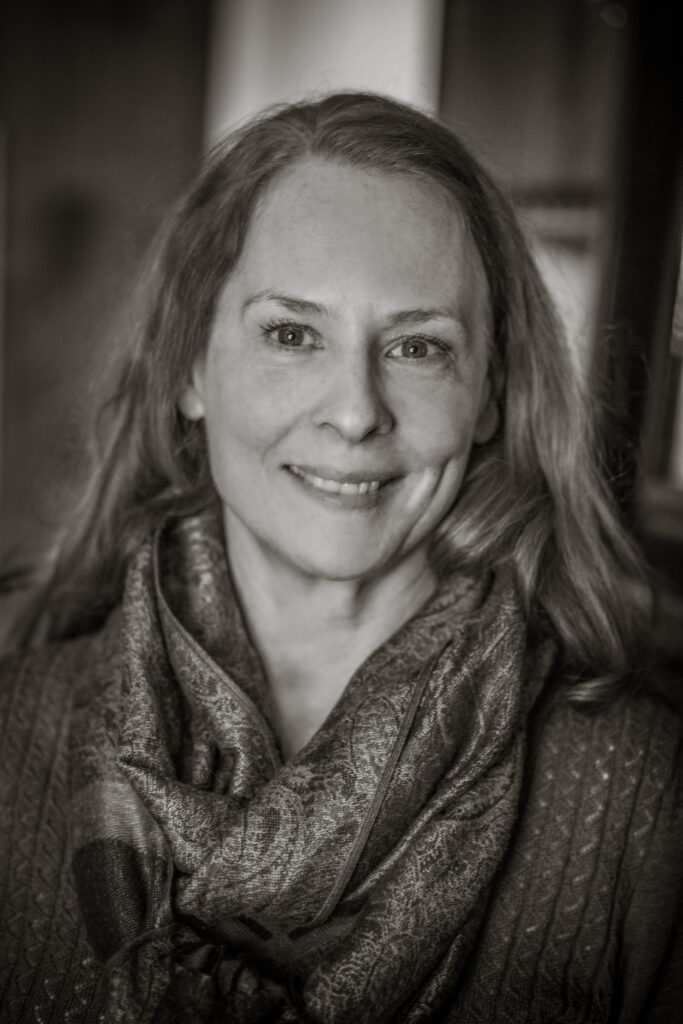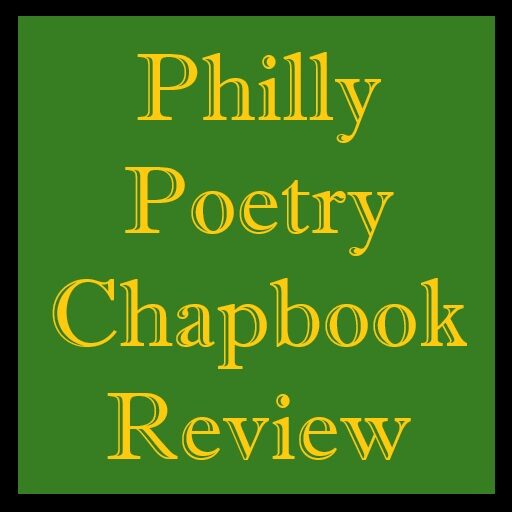Philly Poetry Chapbook Review is pleased to present four original poems by Victoria Korth as our last of six biweekly featured poets of the Spring 2025 issue.
Poems
Ekphrastic
Perhaps the artist’s eyes
were that used to lightless nights
in 1880, villages
too remote for oil, where light
meant to progress and celebrate.
Perhaps he painted it
in the dark, rendering
the surface so like real darkness,
indigo and ebony,
we must dim the lights,
widen our eyes and wait
for shapes to emerge
and fade like fog or smoke, then
having almost given up, see it:
a thatched dwelling,
a lane, crumbly as loam,
and two figures, their backs to the one
lit window’s hesitant tallow.
And because we have shaded
our expectations, held our eyes open
that long, we address
the woman in the charcoal gown,
her shadowy shawl, the child
reaching for her hand,
a tree’s shattered limbs, and wonder
why they have turned away
from Cornoyer’s burnished lamp,
the source that is somehow
our light too, at this hour.
The Great Array
Through the center of my chest
neutrinos pass as through a dark forest.
In the forest is a stubborn pulse,
like a German poet talking to a Swedish poet:
“Grief and the bluish smoke rise as does a zeppelin.”
“The wind shakes in its armor from Svalbard.”
At night with moonlight in the canopy
I try to shape my mind to silence.
At times the body goes along,
curious about the objects in the room.
There is a molecule required for life,
a complex surmised to have self-generated,
and although we can synthesize it
how it came together in the primordial soup
has been a mystery. Until the other day
when ecstatic watchers stood back
as it bolted into being quite modestly in California.
At night, I am consoled by antimatter
around which the thirstiest houseplant feels joyous.
Antineutrinos beamed toward neutrinos
in a Japanese cave failed to snuff each other out
but switched places, slipping on a tiny curve in space-time,
eluding their destiny. A blade of grass burns
at the center of the universe.
Fire runs up another poet’s legs.
Everything arises from asymmetry,
a wobble. I like this explanation for war.
Yet the wobble helps me sleep,
my parents reading to each other
in the other room, baritone and alto,
the recitation of angels,
great array regenerating hope.
Note: Quotes from Hans Magnus Enzensberger and Tomas Tranströmer respectively.
Vermilion Cord
Home, after taking care of patients,
I drift in a wallpapered life, resentful
of my profession’s power to tire
when working out of habit and in haste—
and to be sure-footed among men—
unable to cast off tension in my frame.
Nap or run, eat or talk, it doesn’t go,
even at the bottom of the hill
where lake water is sky.
Perhaps it’s just fatigue.
Perhaps tomorrow there will be less shame
in weakness, less shame in shame in weakness,
the nervous system’s luck to get this far.
Unable to shed the most percussive lessons,
I ask, who has the power
to make themselves lyric,
invoke evening air, delicate vesper scrim,
scent of hickory, when—suddenly—
the keeper of the pain is everywhere,
and I am overlooked,
the shorter, quieter sibling, forgotten
for an hour around which
beauty twines,
dying it crimson.
Pedagogy of Healing
Picture two tracks
like finger marks across a cake
made walking on her knees
beside the East River, in snow
falling through the pelvic floor
where her heart should be.
Witness again his sneaker toe
among take-out containers
and spicules of ice. Hold time
back as the bus stops
and he gets off, draws nears
the water once waved at
from their window, longed for
as it dashed between tenements
like mercury in a glass.
Hold her at arms-length
this evening, dark
as a mid-winter morning.
Listen as she recalls his yellow
shirt, luminous smile,
how late she was that day
as he had been early to his birth,
how she begged the black-backed gulls
to leave his eyes alone.
Pray, are we allowed to pray?
She folds forward, face obscure.
About “The Great Array”
This poem originated in thinking about a few things at once. How the two great poets quoted in the poem create image, especially Tranströmer whom I admire so much. His natural imagery is so organic and unexpected, one can feel it. I think that is where the first few lines came from. The other thing that has been working its way into some of my poetry is my comfort level with both black holes and neutrinos. Quantum physics leads us to the uncanny and the terrifying. I know people fear black holes, but to me they rearrange our relationship to time and to our own lives. When I reflect on the massive black hole at the center of our solar system, I feel happy, both alive and present, but also free. Who can explain it? And one might think that neutrinos and antineutrinos cancel each other out, but they don’t, there is a portion that elude each other. And they are passing through us, through everything, at all times. How not to write a poem about that! The poem’s title is not an overt reference to the Very Large Array in New Mexico, the observatory, but there is some subliminal association. I think of C.S. Lewis and his universe populated by angels, though he is not mentioned in the poem. The time in my life in which I read that author was one when I would have heard my parents talking quietly after dark, after we were in bed. “The Great Array” moves associatively through these thoughts, memories, feelings and images, through a writer’s mind.
Author Bio

Victoria Korth’s work has appeared in Nine Mile Magazine, Cleaver Magazine, Stone Canoe, Ocean State Review, Tar River Poetry, Barrow Street and widely elsewhere. She is the recipient of the Montreal International Poetry Prize 2020 and the Troubadour International Poetry Prize 2024. She is the author of Cord Color (2015) and Tacking Stitch (2022), Finishing Line Press and holds an MFA from The Warren Wilson Program for Writers. She is also a practicing psychiatrist living in upstate New York.

Contents
Book Excerpt: The Prize of Québec by Jennifer Nelson
“I tend to lean into the transconstitutory powers of ekphrasis. … Only in poetry can one go to the moon in a way that critiques the quest for the moon.” Read a poem from Jennifer Nelson’s new collection from Fence Books, On the Way to the Paintings of Forest Robberies.
Chapbook Poem: This Is How They Teach Us How to Want It . . . by Shanta Lee
“This poem explores the levels of our participation in handing ourselves over, often to the people, places, or things that deserve no such delight.” Read a #poem from Shanta Lee’s new book from Harbor Editions, This Is How They Teach Us How to Want It . . . The Slaughter.
Three Poems by Jonathan Fletcher
“Instead of having to choose between religion or the LGBTQ community (which I know many member of the latter feel they have to do), I think it is possible (and maybe even biblical) to integrate both into one’s life.” Read three original poems from Jonathan Fletcher, along with words from the author.
What Happened? On You are Leaving the American Sector by Rebecca Foust
“Rebecca Foust’s new chapbook of poems has a strange prescience. … Foust isn’t alone in making the obvious connection between Trump’s first term and Orwell’s dystopia.” Read the full chapbook review by new contributor Rick Mullin.
‘What if we started creating together? What if we looked at who we are from the side and saw a much more complete and honest perspective?” Read four poems by poet Sarah E N Kohrs, along with words from the poet.
Book Excerpt: Challenger by Colleen S. Harris
“If we look beyond the voyeuristic tendency to focus on the tragedy, what might we see? This poem was a chance for me to zoom in on the calm before the storm.” New poem from Colleen S. Harris’s new book from Main Street Rag, The Light Becomes Us, along with words from the poet.
Chapbook Poem: What I Did This Summer by Elinor Serumgard
“I love New Year’s and the promise of a new start, but I like to remind myself that you can start fresh at any point throughout the year.” New poem from Elinor Serumgard’s chapbook from Bottlecap Press, Analogous Annum, along with words from the poet.
Four Poems by Christa Fairbrother
“Since women aren’t allowed the power of our anger, we take it out on each other, and that’s what this poem is hinting at.” Read four poems by Christa Fairbrother, along with words from the poet.
Multilingualism and Metaphor: On Desire/Halves by Jaia Hamid Bashir
“Bashir’s elegant debut collection investigates identity as the result of choices between individual appetites and cultural frames. … [It] announces an exciting addition to the global chorus of contemporary literature.” Read D.W. Baker’s full review.
Five Poems by Jane Ellen Glasser
“In my fantasy world, I would be able to communicate with the animals I see every day.” Read five naturalist poems by poet Jane Ellen Glasser, along with a few words from the poet.
Book Excerpt: Ars Poetica by Leigh Sugar
“[C]ould there be, a poetry that does investigate the body, without explosion? Maybe even with an effort towards reconstruction?” Read an excerpt from Leigh Sugar’s book, FREELAND, from Alice James Books, along with words from the author.
“…she has a sense of style, a modicum of grace, and she recognizes her place in the cosmic order, where revolution rules every other Wednesday and twice, of course, on Sundays…” Read three poems by Bart Edelman along with words from the poet.
Chapbook Poem: I Worry by Flavian Mark Lupinetti
“I can’t begin to imagine doctors in Gaza courageously practicing medicine while intentionally targeted by the Israeli army aided by the United States.” Read the featured Chapbook Poem of the Month for June 2025, “I Worry” from The Pronunciation Part by Flavian Mark Lupinetti.
“Quantum physics leads us to the uncanny and the terrifying. I know people fear black holes, but to me they rearrange our relationship to time and to our own lives.” Read four #poems by Victoria Korth along with words from the poet.

